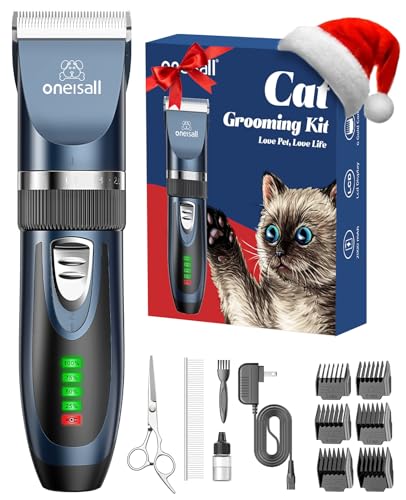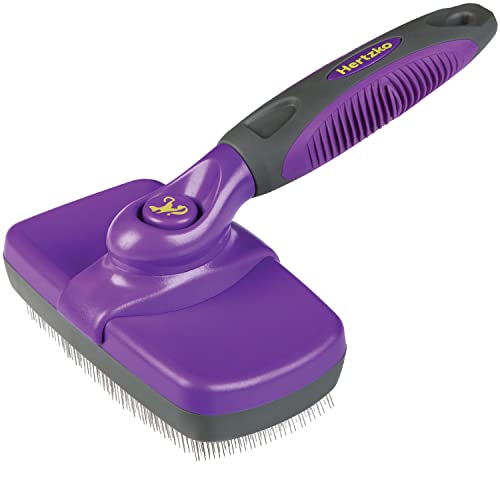Welcome to the step-by-step guide on how to introduce a cat to grooming tools! In this guide, we will walk you through the process of introducing your furry friend to the world of grooming supplies. Grooming is essential for every cat’s well-being, but we understand that some cats can be quite resistant to the idea. Don’t worry though, we’ve got you covered! We will provide you with expert tips and techniques to make the grooming experience a positive and enjoyable one for both you and your cat. So get ready to learn how to make your cat look and feel fabulous while having some fun along the way! Oh, and did you know that some cats actually enjoy being groomed more than being petted? It’s true! So let’s dive into the guide and discover how to introduce your cat to the wonderful world of grooming tools.
Purr-fect Picks for Your Feline Friend!
Prepare the grooming tools
Gather all the necessary grooming tools such as a cat brush, nail clippers, and grooming gloves. Start by checking that each tool is clean and in good condition. This ensures a comfortable grooming experience for your furry friend. Inspect the bristles of the cat brush to ensure they are not worn out or tangled with hair. Check the nail clippers for any signs of rust or dullness, as sharp clippers are essential for a safe and efficient grooming session. Lastly, make sure the grooming gloves are free of any tears or loose threads that could potentially harm your cat. By taking these simple steps, you’ll be well-prepared to give your cat a thorough and enjoyable grooming session.
Introduce the tools gradually
Start by placing the grooming tools near your cat’s favorite spot or near their toys. This will help your cat associate the tools with positive and familiar surroundings. Allow them to sniff and explore the tools at their own pace. Cats rely heavily on their sense of smell, so giving them the opportunity to familiarize themselves with the scent of the tools will help them feel more comfortable. You can also try using treats or catnip to further encourage their curiosity. By introducing the tools in this way, you are creating a positive and stress-free environment for your cat, which will make the grooming experience much more enjoyable for both of you.
Positive associations
Associate the grooming tools with positive experiences by using treats or praise while your cat is near the tools. This will create a positive association and make grooming a more enjoyable experience for your furry friend. To start, gather your grooming tools and place them in an easily accessible location. Next, have some treats or a favorite toy ready. When your cat is nearby, pick up one of the grooming tools and offer a treat or give them praise. Repeat this process several times, gradually increasing the amount of time your cat spends near the tools. This will help them associate the tools with positive experiences. Remember to be patient and take it slow, allowing your cat to gradually become more comfortable with the grooming tools. Soon enough, they will start to see grooming as a positive and rewarding activity.
Touch and familiarization
Gently introduce your cat to grooming tools by touching them in areas they already feel comfortable with, such as their back or head. Begin by using a soft brush or your hand to stroke these areas gently. As your cat becomes more relaxed, gradually increase the areas you touch with the grooming tools. For example, you can start by brushing their back and then slowly move to their sides and stomach. This gradual approach allows your cat to get used to the sensation and build trust in the process. Remember to always be gentle and patient, providing positive reinforcement with treats or praise to encourage your cat’s cooperation.
Short grooming sessions
To initiate short grooming sessions with your cat, start by setting aside just a few minutes at a time. Begin by using gentle strokes or light brushing with a soft grooming tool. For example, you can start by using a soft bristle brush or a grooming mitt. Slowly and calmly approach your cat, and if they are receptive, start grooming them in the direction of their fur growth. Be sure to use soft, gentle strokes to avoid causing any discomfort.
As your cat becomes more relaxed and comfortable with the grooming process, gradually increase the duration of the sessions. You can do this by adding an extra minute or two to each grooming session. Remember to always observe your cat’s body language and reactions. If they seem stressed or anxious, pause the grooming session and try again later.
By taking the time to gradually introduce and increase the duration of grooming sessions, you are allowing your cat to become more accustomed to the grooming tools and the overall experience. This approach helps build trust between you and your cat, making future grooming sessions more enjoyable for both of you.
Reward and praise
Rewarding your cat with treats and praise is a great way to reinforce positive behavior during grooming sessions. After each successful grooming session, make sure to give your cat a tasty treat that they enjoy. This could be a small piece of their favorite snack or a special treat specifically designed for cats. Along with the treat, provide verbal praise to let them know they’ve done well. Use a positive and enthusiastic tone of voice to show them how proud you are.
By consistently rewarding your cat with treats and praise after each successful grooming session, you are helping them associate grooming with positive experiences. This positive reinforcement will make them more comfortable and cooperative during future grooming sessions. Remember to be patient and provide plenty of encouragement throughout the process. With time, your cat will begin to enjoy grooming as a rewarding and pleasurable activity.
The Final Steps
In conclusion, introducing a cat to grooming tools is a gradual process that requires patience and positive reinforcement. By following the steps outlined in this guide, you can help your cat become comfortable with grooming tools and make the experience a positive one for both of you. Remember to start slow, use treats and rewards, and always prioritize your cat’s comfort and well-being. With time and consistency, you’ll be able to groom your cat with ease and maintain a healthy and happy feline friend.
Essential Supplies
Mastering Feline Pampering
Mastering Cat Grooming: Your Ultimate Guide to Getting Your Feline Friend Comfortable | Episode One: Grooming Tips
Master the art of cat grooming with the right supplies
- Start with a gentle brush: Begin by choosing a soft-bristled brush specifically designed for cats. This will help remove loose hair and prevent matting. Begin brushing your cat’s fur in the direction of hair growth, going slowly and being gentle to avoid any discomfort
- Use cat-friendly shampoo: When bathing your cat, it’s important to use a shampoo that is specifically formulated for cats. Dilute the shampoo as per the instructions provided, and make sure to wet your cat’s fur thoroughly before applying it. Gently massage the shampoo into their fur, avoiding their face and ears. Rinse off the shampoo thoroughly using lukewarm water
- Trim nails carefully: Invest in a quality pair of cat nail clippers and learn how to trim your cat’s nails safely. Make sure to be cautious and trim only the pointed tip of the nail, avoiding the quick (the sensitive area containing blood vessels). If you’re unsure, ask your veterinarian or a professional groomer for guidance
- Clean their ears: Use a cat-specific ear cleaner and a cotton ball to gently clean your cat’s ears. It’s important to be gentle and avoid inserting anything deep into the ear canal. Simply dampen the cotton ball with the ear cleaner and gently wipe the visible parts of the ear, removing any dirt or wax
- Regularly check for fleas and ticks: Use a flea comb to check your cat’s fur for any signs of fleas or ticks. If you find any, consult with your veterinarian for appropriate treatment options. Prevention is key, so consider using a monthly flea and tick preventive recommended by your vet
- Remember, patience and positive reinforcement are crucial when grooming your cat. Take your time, be gentle, and always prioritize your cat’s comfort and well-being. If you have any concerns or questions, don’t hesitate to consult with a professional groomer or your veterinarian
Everything You Need to Keep Your Feline Friend Looking Fabulous
What are the essential cat grooming supplies I should have?
Sure! As a friendly expert, I’m happy to help you out with that. When it comes to cat grooming supplies, there are a few essentials that every cat owner should have on hand. Here are the top ones:
- Cat Brush: A good quality brush is crucial for grooming your cat’s fur and keeping it tangle-free. The type of brush you choose will depend on your cat’s coat length and texture. Slicker brushes and bristle brushes are popular options.
- Nail Clippers: Trimming your cat’s nails regularly is important for their health and to prevent scratching accidents. Look for cat-specific nail clippers that are designed to make the process safe and easy.
- Cat Shampoo: Cats are generally good at keeping themselves clean, but occasionally they may need a bath. Choose a mild, cat-specific shampoo that won’t irritate their skin. Avoid using regular human shampoo as it can be too harsh for their sensitive skin.
- Cat Toothbrush and Toothpaste: Dental care is often overlooked in cats, but it’s important for their overall health. Get a cat toothbrush with soft bristles and a toothpaste specifically formulated for cats. Regular brushing can help prevent dental issues.
- Ear Cleaner: Cats can sometimes develop earwax buildup or ear mites. Having a cat-friendly ear cleaner will help you clean their ears safely and prevent any infections.
Hello! I’m Ava Wilson, the passionate founder of Pet Pantry Place, your go-to destination for all things pet-related. My mission is to create a platform where fellow pet enthusiasts can discover the finest supplies and gain valuable insights to ensure a joyful and fulfilling life for their pets.








